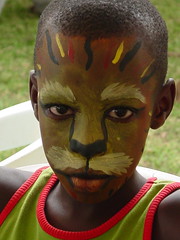Lions Don't Smile
Back when I was in school earning my teaching credentials there was some sort of kids festival. The participation of teachers in training may not have actually been required, but anyone with good sense knew to be there. Among the many clues I should have picked up on that teaching elementary school wasn't for me, is that I don't like to get up early in the morning. I showed up at the festival anyway at 8:00 in the morning and to my surprise there were already lots of eager kids there. After doing some lumber work, moving heavy stuff around the auditorium room, I was assigned duty as a face painter.
Nothing in my experience prepared me for the task. I told my first client as much, so we talked strategy about the whole effect. He'd mention ideas and I tell him I didn't think I could accomplish that, so he'd go on to others. Mostly we just had a nice chat, engrossing enough so I didn't notice picture taking going on. There we were on the front page of the Sunday newspaper. Even better, I discovered on Monday that the kid was the son of one of my professors and that I had endeared myself to her. What luck! So this picture charmed me, taken apparently at a similar bon fete for kids in Kampala. I'd be willing to bet the caption was provided by the dour lion upon being instructed to smile for the camera. "Get a grip, lions don't smile."
In the last post I linked to several Web pages advancing the argument that aid to Africa, especially large scale projects has many negative ramifications. I neglected to provide a link to Jeffery Sachs as counterpoint. In Sachs' book, The End of Poverty: Economic Possibilities for Our Time he writes:
Africa's governance is poor because Africa is poor.For those trying so hard to improve things by focusing on the governance in African countries this point of view isn't particularly appreciated.
Word Press seems to be down right now, so I'm can't get the links, but Ethan Zuckerman at My Heart's in Accra returns to blogging after a two-day vacation with four interesting African articles he read in the meantime. When Doing Good Also Aids the Devil is one from the Sunday New York Times. The problems of Africa and aid to Africa are complex. Ethan Z also linked to a Zimbabwean friend's blog, Dumisani Nyoni. My experience with Africans is very limited, but in my limited experience I've been very impressed by a talent for debate and discussion. Nyoni is offended by this article in the European editon of Time in late Novemeber. I liked very much how he prefaced his criticism:
If I didn’t believe that debate, dialogue and discussion were by far the best way of learning and bringing about change, I would ask them all to put their pens and cameras down. But debate is informative so let it be.Debate is informative, and with such complicated issues as aid, more voices are better than one.
I was looking for a story about a conversation between a Christian missionary and an Ugandan elder that took place in the early colonial days of the late 1800's. I can't reamember where I read it, and thought perhaps it was in C. G. Jung's memoir Memories, Dreams, Reflections. The section dealing with Jung's travels to Kenya and Uganda are short and the anecdote isn't there. I've had this book for a long time and the cover is eaten around the edges by insects. I've never known quite what to make of it, and perhaps why I keep it on my bookshelf. I continued reading it well after I'd satisfied my search. This made me pause and think:
[E]vil can no longer be minimized by the euphemism of the privato boni. Evil has become a determinant reality. It can no longer be dismissed from the world by a circumlocution. We must learn how to handle it, since it is her to stay...It seems that having to "deal with evil" as Jung suggests is a lot different from slaying evil. And the New York Times article quotes aid officials suggesting that they need to be more public about the bargins they strike.
In practical terms, this means that good and evil are no longer so self-evident. We have to realize that each represents a judgment. In view of the fallibility of all human judgment, we cannot believe that we will always judge rightly...Nevertheless we have to make ethical decisions.
It occurs to me that the increasing veil of secrecy demanded by the US government in its "war on terror" obscures the difficult ethical judgments that must be made. The propaganda frames the "war on terror" as good against evil. Yet most Americans after WWII, Korea, The Cold War, Vietnam, and the many other military excursions abroad, know that ethical behavior is more complicated than that; Jung really was onto something.
Something I love about the lion face, and his refusal to smile, is of course in the afternoon or before bedtime he'll wash his face and no longer be a lion. Across African societies debates are valued, and there is a tradion that contrary voices be heard. The strong disagreements the likes of Thomas Sowell and Jeffery Sachs are important. I supposed neither is able to wash his face thereby return to who they are again. Still with important and complex issues we can do something like paint our face for a day to get inside one side of the debate. Then wash our face and paint our face the next day with the opposite side. Ethical judgments are difficult and an addiction to seeing things only one way and from a single direction will increase our chances of misjudgment.

No comments:
Post a Comment